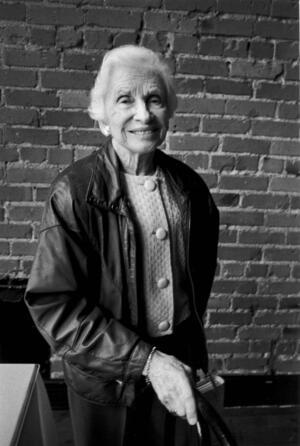Shirley Bridge
Shirley may have only been five feet tall, but she was a giant. She was a giant as a leader; as a community activist, a generous philanthropist, a wife and mother, and a giant as a friend.
I first met Shirley in 1972, when she was the president of the Seattle Women's Commission. We bonded instantly when we learned that we had each been denied credit in our own names because we were married, even when we had our own jobs and our own incomes. Shirley had wanted to borrow some money to help a friend, and the bankers said "We're sure Herb won't mind." Well, Herb did not mind, but Shirley did. So, to make a long story short – in 1973, Washington became the first state in the nation to ban discrimination in credit and insurance based on sex or marital status. We've been making trouble together ever since.
I had never seen a woman so bold before! And, like all of us, I wanted to make a difference. So, Shirley loved to take on causes and I was at her side for the adventure. She became my role model, mentor, soul mom, and ultimately my dearest, dearest, sweetest friend of nearly 40 years.
But what you may not know with all these daring roles is–Shirley did not drive. So those of us who are fighting for women's rights are calling each other… "I can pick her up, can you take her home?" When the movie came out about the same time, we coined the expression "Driving Miss Shirley." And we drove her with pride and honor.
Shirley was truly a giant as a friend. Yes, you often "paid" for being a friend, because you always got the call for this candidate or that cause, and of course it is always easier to say yes to Shirley than say no. But if she knew you could not afford it, there was always space at the table and you were always included.
And she had a wealth of friends. There was a group called the Nertzes, all professional working women, who met frequently for breakfast at the Georgian Room at the Olympic Hotel, and other places, where they would have breakfast and drink champagne before they went to work. They also took frequent trips to Las Vegas. Shirley loved to play poker and blackjack, and she won.
Just as the Seattle community won from her gambles on causes few others would touch. Whether it was women's rights, political candidates, health care reform, cutting edge or seemingly impossible causes, she championed them and pretty soon, so did everyone else. And suddenly you have a Bailey-Boushay House, an Endowment at the Jewish Federation, legally binding equal opportunity in employment, credit and housing, a Basic Health Plan and insurance plans that covered contraceptives as well as Viagra.
In her heyday, phones of her family and friends were ringing off the hook, sometimes at the most amazing times–like 5:30 or 6 AM. "Okay. Either someone died or it's Shirley."
And if she succeeded as a community activist, she also succeeded in family. She and Herb celebrated 60 robust years of marriage. And as we have seen what Jon and his wife, Bobbe, and Dan now with his wife, Sim, have brought to this community, we all know that apples don't fall far from the tree.
While Shirley and I became friends from a joy of political plotting, our friendship deepened when my son was killed in a car accident in 1991. Shirley simply would not let me quit. She made me come to dinners, breakfasts, projects. I could never say "no"; it was Shirley. I have no idea that first raw year where we went, what we did, or who we met. But she kept me going, because she knew that you can't quit. Because of her, I didn't quit. Because she never quit on a friend, on a cause, or fighting cancer.
When her colon cancer returned in the late 90s, she had chemotherapy since they found cancer in her lymph nodes. But we kept going out for dinner, and since she could not drink on chemo, she would order a martini for me and a side of olives for her, so she could stuff them in my martini and eat them for the taste. To this day, there are restaurants in town thatwould see us coming and have a martini with a side of olives ready to go.
Because of her, I am who I am today. Because of her, I have learned you really can make a difference and make seemingly impossible changes that dramatically affect people's lives. But most of all she was the sweetest friend. She would take me to dinner. We would gossip and giggle. I would take her on drives to the country. She would tell me of her childhood. I would bake her berry pies and soda bread.
So if I would leave you with any legacy of Shirley. It would be two things: serve and be a good friend.
Can you imagine the holes we would have in this community if Shirley had said: "This is too big a project. This will cost too much money. This will take too much time. I won't get anyone to help. I can't do this. I am only one woman." Shirley's life demonstrated without a doubt the power of one and the power of love and devotion to family and friends. And if this one small woman can be a giant in so many things, challenge yourself to be the same.



